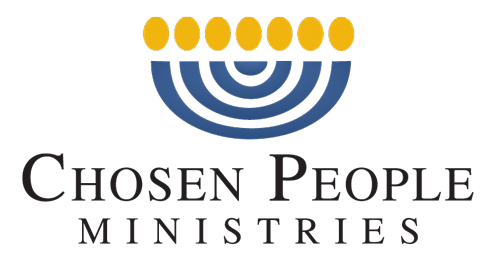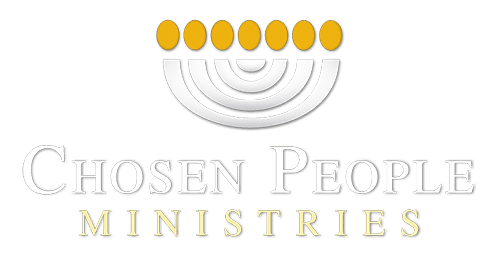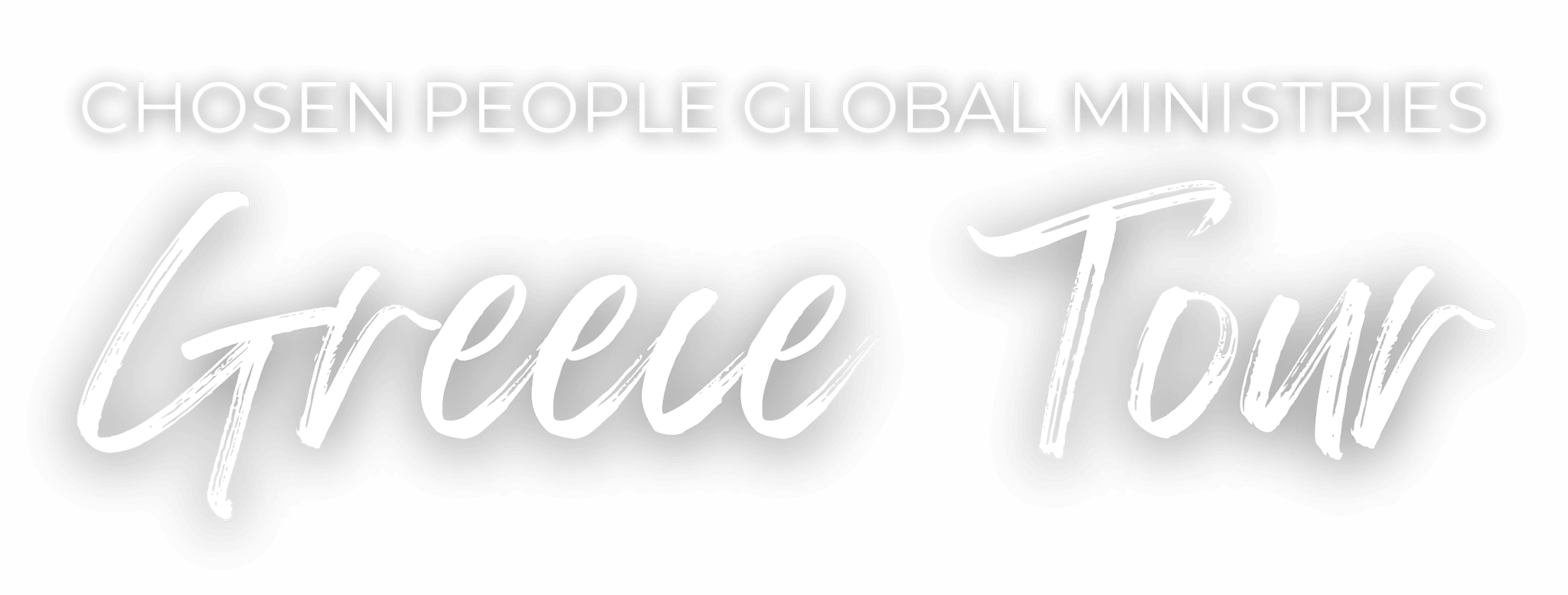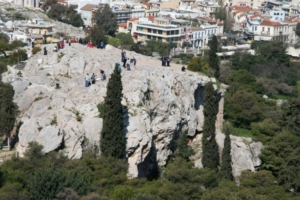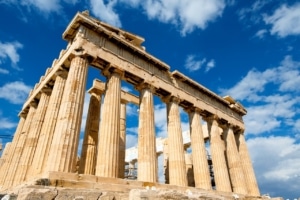July 3-9, 2023
Hotels:
ATHENS – HOTEL DIVANI PALACE ACROPOLIS
Tel : +30 21 0928 0100
Parthenonos 19, Athina 117 42
KALAMBAKA – HOTEL GRAND METEORA
Tel : +30 2310 549 000
Kastraki, Kalampaka 42200
THESSALONICA – GRAND HOTEL PALACE
Tel : +30 2 432 077 707
Monastiriou 305, Thessaloniki 546 28
EMERGENCY CONTACT:
Local representative in Greece
+30 6944 344167 Dino Roussos
- Please do not bring peanut or peanut butter products on this tour as there is an attendee with a severe peanut allergy.
- There will be bottled water for purchase on the buses.
- There will be two tour buses. You will be assigned a bus and must stick to that bus the whole trip.
- There are a couple of sites where you will need to have shoulders covered as well as long shorts/knees covered. Please pack accordingly.
- Tips are suggested in the amount of $20/day per person which will be divided up for the guides, bus drivers, housekeeping, porters, and hotel staff.
Greece Tour Itinerary
DAY 1: MONDAY, JULY 3 ARRIVE ATHENS—ATHENS
Arrive at Athens Airport and meet with your Bible-oriented guide. Your journey to the biblical land of Greece begins! Transfer to the hotel for check-in, dinner, and overnight at HOTEL DIVANI PALACE ACROPOLIS.
D—Dinner
DAY 2: TUESDAY, JULY 4 PARTHENON—MARS’HILL—ACROPOLIS MUSEUM
Depart from the hotel after breakfast. Climb up to Acropolis Hill to see the famous Parthenon Temple, Erectheion, and Temple of Athena Nike. Then walk to nearby Mars’ Hill (Areopagus) (Acts 17:22) where the apostle Paul spoke to the Athenians about the one and only God. Enjoy lunch at a local restaurant (set menu—included) and continue with a visit of the fabulous Acropolis Museum followed by a panoramic tour of the city highlights viewed from the bus. Return to the hotel. Evening at leisure. Overnight stay at HOTEL DIVANI PALACE ACROPOLIS.
B—BREAKFAST, L—LUNCH
DAY 3: WEDNESDAY, JULY 5 ATHENS—KALAMBAKA—METEORA MONASTERIES
Drive through the towns of central Greece, crossing the fertile plain of Thessaly before reaching the beautiful town of Kalambaka. Visit the spectacular Meteora monasteries built on the top of huge gray boulders. They are veritable Byzantine monasteries exhibiting superb icons and manuscripts from the fourteenth century. Dinner and overnight at HOTEL GRAND METEORA in Kalambaka.
B—BREAKFAST, D—DINNER
NOTE: After dinner, we will have a lecture from Dr Darrell Bock and Dr Alan Shore.
DAY 4: THURSDAY, JULY 6 BEREA—THESSALONICA
Continue on to Thessalonica. On our way, we stop at Berea (Acts 17:10–15) where Paul arrived and, according to his custom, went to the synagogue where, to his pleasant surprise, he discovered that the Jewish people there were “more noble” than those he had encountered in Thessalonica. We see the Byzantine mosaic in the monument commemorating his preaching (Acts 17:10–11). We arrive in Thessalonica in late afternoon and enjoy a tour of the city (Acts 17:1) where Paul went immediately to the synagogue, and for three Saturdays, he explained the prophecies of the Old Testament to Jews and Greeks. According to the book of Acts, many Greeks believed and even many “Greek chief women” (Acts 17:1–4). We go to the upper Old City Walls then drive along the Egnatian Way to see the Triumphal Arch of Galerius and the Rotunda. After the visit, check-in at the hotel in Thessalonica. Dinner and overnight stay at GRAND HOTEL PALACE.
B—BREAKFAST, D—DINNER
DAY 5: FRIDAY, JULY 7 PHILIPPI—KAVALA—THESSALONICA
On our way to Philippi, we drive by the Lion of Amphipolis (short stop for photos).We visit Philippi, the site where Paul established a strong church. To this congregation he sent his letter (Acts 16:9-33). We see the river where Lydia is said to have been baptized, the ruins of a prison where Apostle Paul and Sylas had been kept, the Agora, 5th and 6th century Basilica and the Theater. After the visit, we continue to Kavala, the ancient port of Neapolis (Acts 16:11) where we enjoy a panoramic tour before returning to Thessalonica for dinner at GRAND HOTEL PALACE.
B-BREAKFAST D-DINNER
NOTE: After dinner, we will have a lecture from Dr Darrell Bock and Dr Alan Shore.
DAY 6: SATURDAY, JULY 8 RETURN TO ATHENS
(500km – Approximate driving distance 8hrs including stops)
After breakfast at the hotel, we take the road back to Athens. We pass through Katerini and gaze upon the snow-capped Mount Olympus, the home of the twelve ancient Olympian gods and goddesses. We go through the Valley of Tempe and stop at Thermopylae to see the statue of Leonidas. It commemorates the historic battle between the 300 Spartans, led by Leonidas, and the Persian army of Xerxes in 480 bce, composed of thousands. Check-in at the hotel in Athens. Evening at leisure. Dinner and overnight stay at HOTEL DIVANI PALACE ACROPOLIS.
B—BREAKFAST, D—DINNER
DAY 7: SUNDAY, JULY 9 ANCIENT CORINTH—DEPARTURES
Early drive to the historic city of Corinth (Acts 18:1–18) where the apostle Paul lived and worked, established a thriving church, subsequently sending two of his epistles now part of the New Testament. After visiting Corinth, see the breathtaking Corinth Canal and eat a final late lunch together before transferring to Athens Airport or your own travel plans.
B—BREAKFAST, L—LUNCH
**Remember the bus driver and guide will need to be paid gratuity at the end of the tour.
Passage to read: Acts 17:16-34
This is Paul’s speech at Mars Hill. In it he introduces the gospel to people who know nothing about the God of Israel or the Bible, a place where many people in our world today also are. The grounding is we are creatures of a Creator God to whom we are accountable and whom a temple cannot hold. There is no direct citation of Scripture, unlike the speeches in Acts 2 and 3. There is a theological story that undergirds the speech told in everyday terms. In addition, Paul in Acts 17:28 Paul quotes both the Cretan philosophers Epimenides and Aratus the Stoic? He shows an awareness of his audience and appeals through ideas that are in their culture as he gives his speech. This might be a guide to how we share with those who know little about God.
The City
Athens was the Ivy League city of the ancient world, its intellectual hub. This is so even as Rome became the political central of power. It is the home of Socrates and Plato and Aristotle, who lived in the 400’s-300’s BC. Many core classical ideas about society and life emerged from their works. The organization of society was the topic of Plato’s The Republic. There was much focus on what the “city” should look like. The term for city in Greek is the polis. Our term politics is derived from thinking through how society and the city functions.
A second feature of the city will be obvious. It is the array of gods that are present in the city. The iconic Parthenon dominates one’s impression of Athens, Mars Hill sits off to the side of this location. Ancient life was full of many gods each of whom had their role. One bartered with the gods to keep them on your side. You will be surrounded by their presence as you walk the streets of the ancient part of the city. Then imagine the reaction of someone who lived in this world with all these gods and temples as Paul speaks on Mars Hill, also known as the Aeropagus.
Passages to Read: Acts 16:11-40; Philippians 2:1-11; 3:17-21
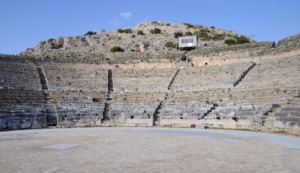
Theater at Philippi (Source: MrPanyGoff/Wikimedia Commons)
These texts present both the example of Jesus and the call we have to a citizenship that transcends our nationalities. They call us to look outward towards others and upwards towards God. Love and humility are the call of the Christian who is to be like Jesus. Our heavenly citizenship means we are less attached to the world, being in it as exiles and ambassadors representing another “country” whose ways are not those of the world.
The City
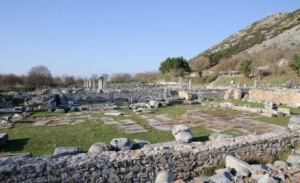
Philippi (Source: MrPanyGoff/WikimediaCommons)
Philippi was founded in the 6th century BC and was located on a major ancient thoroughfare known as the Egnation Way. It was named after Philip of Macedon, the father of Alexander the Great. It was the site of a major battle between Antony and Octavian (Augustus) versus Brutus and Cassius in 42 BC that led to Augustus becoming Caesar. Augustus later defeated Antony at Actium and became emperor of Rome. Augustus was the emperor of Rome when Jesus was born. After that, it became a Roman colony and military outpost that was self governed and was exempt from taxes. There were so few Jews here that there was no synagogue.
Passages to read: Acts 17: 1-9; 1 Thessalonians 1:2-10; 4:1-12; 2 Thessalonians 1:5–2:17
Paul commended this community as exemplary as he wrote to them. Later in the same letter he exhorts them to excel still more. So doing well, they are to pursue holiness more and more. The contrast with Gentile lifestyle shows up here as it has in other NT texts. The call is to live a quiet and decent life before outsiders and not be in need. In the second letter it becomes clear the Thessalonians are suffering for their faith. Paul urges them to appreciate that justice will come one day even in the midst of extreme lawlessness and to stand firm.
The City
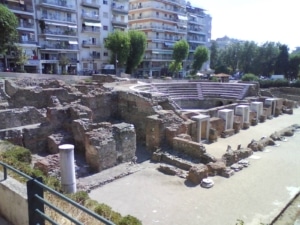
Roman forum in Thessalonica (Source: Evilemperorzorg/Wikimedia Commons)
The city today is known as Thessaloniki. Founded in 316 BC, by the Macedonian general Cassander. He names it after his wife Thessalonike, daughter on Philip of Macedon and father of Alexander the Great. The city was a major stopping point as it was located at the junction of two key ancient roads: the Ignatian way (built in 130 BC and running east to west) and the other running from the Danube River to the Aegean Sea. It was the capital and major port for Macedonia in 146 BC. It became a free city after the battle of Philippi. The core archaeological remains are located right in the heart of the city. It is the second largest city in Greece today.
Passages to read: Acts 18:1-18; 1 Corinthians 1:18-31; 8:4-6; 13:1-13
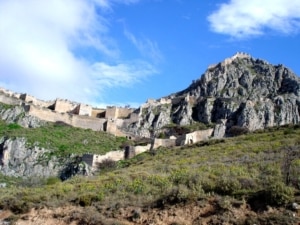
Acrocorinth (Source: elveoflight/Wikimedia Commons)
The texts of Corinth highlight three different key themes in the letter: the way of the cross is not the way of the world, how Jesus is unique, and the call to love as the core ethic of the faith. The 1 Cor 1 text also gives us a glimpse of the sociological makeup of the church. The 1 Cor 8 text plays with the Shema and reads it with a Christological twist that is one of the most important texts on Jesus in the New Testament. In 1 Cor. 13, the call to love in the midst of discussing the gifts shows that how we relate to one another is more important as what knowledge and gifts we possess.
The City
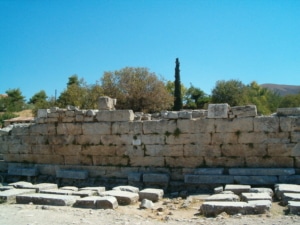
Bema (Source: Zde/Wikimedia Commons)
Corinth is located under what is known as the Acrocorinth towering 1886 feet over the city. It had a long history that can be traced back to 3000 BC, but was reestablished as a Roman colony under Julius Caesar in 44 BC. It was the administrative capital of Achaea. It is dotted with temple and market areas. It has one of the most famous remaining Bema or judgment seats where civic activity took place. Situated on an isthmus, it had ports on both gulfs to which it was attached.
